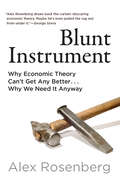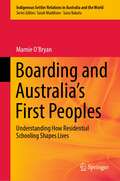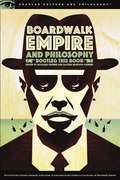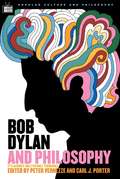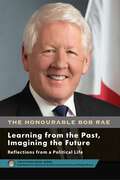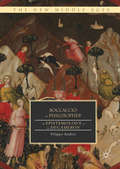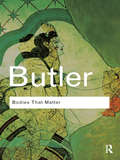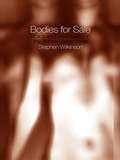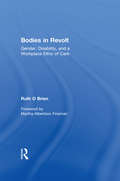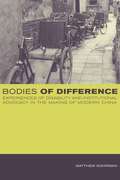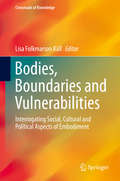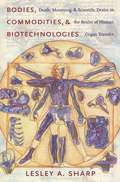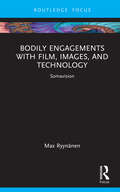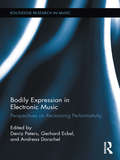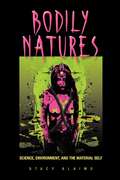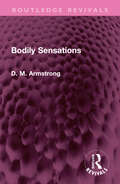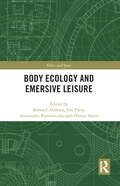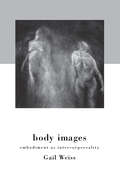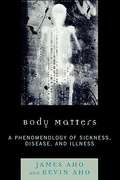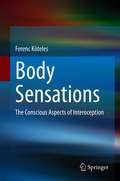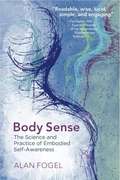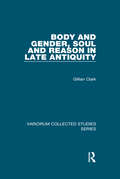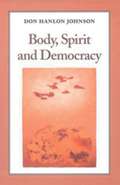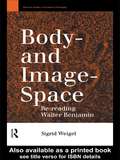- Table View
- List View
Blunt Instrument: Why Economic Theory Can't Get Any Better...Why We Need It Anyway
by Alex RosenbergWhy economic theory—with no track-record of predictive success—is still an indispensable tool for protecting civilized life.Economic theory has never gotten any better at prediction. Its explanations are always after the fact. The mathematical models economists have devoted themselves to for more than a century can&’t be improved to enhance their empirical relevance. But from this research program that never paid off, a very useful tool has emerged—game theory. It&’s just what civilized society needs to protect itself from the rapaciousness that condemns all markets to fail. In Blunt Instrument, Alex Rosenberg helps explain to outsiders exactly what they need to make sense of economic theory, and why despite its failures, it&’s still indispensable.Economic theory is something we all should understand because the economy affects us all, and it is economic theorists who shape that economy for good or ill. No less an economist than John Maynard Keynes expressed the point in a memorable quotation: &“Practical men, who believe themselves to be quite exempt from any intellectual influence, are usually the slaves of some defunct economist.&” This book draws back the curtain from the math and the graphs that deliver microeconomic and macroeconomic models. It demystifies the formidable-looking equations, explaining the reasoning behind the math so that outsiders can decide on the theory&’s importance to their own thinking about the economy. Finally, it shows how game theory—the study of strategic choice—emerged from the outlandish idealizations of economic theory. Most importantly, it illuminates how game theory both mitigates the failures of real-world economies and improves the design of important human institutions.
Boarding and Australia's First Peoples: Understanding How Residential Schooling Shapes Lives (Indigenous-Settler Relations in Australia and the World #3)
by Marnie O’BryanThis book takes us inside the complex lived experience of being a First Nations student in predominantly non-Indigenous schools in Australia. Built around the first-hand narratives of Aboriginal and Torres Strait Islander alumni from across the nation, scholarly analysis is layered with personal accounts and reflections. The result is a wide ranging and longitudinal exploration of the enduring impact of years spent boarding which challenges narrow and exclusively empirical measures currently used to define ‘success’ in education. Used as instruments of repression and assimilation, boarding, or residential, schools have played a long and contentious role throughout the settler-colonial world. In Canada and North America, the full scale of human tragedy associated with residential schools is still being exposed. By contrast, in contemporary Australia, boarding schools are characterised as beacons of opportunity and hope; places of empowerment and, in the best, of cultural restitution. In this work, young people interviewed over a span of seven years reflect, in real time, on the intended and unintended consequences boarding has had in their own lives. They relate expected and dramatically unexpected outcomes. They speak to the long-term benefits of education, and to the intergenerational reach of education policy. This book assists practitioners and policy makers to critically review the structures, policies, and cultural assumptions embedded in the institutions in which they work, to the benefit of First Nations students and their families. It encourages new and collaborative approaches Indigenous education programs.
Boardwalk Empire and Philosophy
by Richard Greene Rachel Robison-GreeneFrom Machiavellian city officials to big time mobsters (such as Arnold Rothstein, Lucky Luciano, and Al Capone) to corrupt beat cops to overzealous G-men to suffragettes to abolitionists to innocent citizens caught in the crossfire, Boardwalk Empire is replete with philosophically compelling characters who find themselves in philosophically interesting situations. As Boardwalk Empire is based on historical events, political figures and mobsters, the philosophical issues raised bear on "real life" in the way the few fictional television shows and movies do. We see parallels with the events in Boardwalk Empire and contemporary political events, and between the characters in Boardwalk Empire (good, bad, and ambiguous) and contemporary figures. It is one of the most popular HBO television shows ever and its popularity is on the rise. In this volume, twenty philosophers address issues in political philosophy, ethics, aesthetics, feminism, and metaphysics. Gregory Littman analyzes Nucky Thomson as a Machiavellian Prince. In contrast, Richard Greene casts Thomson in the role of a Nietzschean superman. Michael Da Silva looks at the complex relationship between Nucky and Jimmy (Nucky's young protégé). Jimmy feels resentment towards Nucky for the role he played in bringing together Jimmy's father and his very young mother. Is this resentment justified given that Jimmy would never have come into existence had his parents not met? Is there a moral difference between the harm that Nucky allowed to happen and the direct harm caused by Jimmy's father? Don Fallis considers the ethics of lying in the seedy world of bootlegging. Agent Van Allen's unique religious attitudes bring a warped sense of morality to the Boardwalk universe. Roberto Sirvent brings to light the moral character of Van Alden's God. Thomson advises to "never let the truth get in the way of a good story." Rod Carveth explores the role that storytelling pays in the series and Cam Cobb illustrates the role of deception. Pat Brace and Maria Kingsbury address "Outsiders, Alcohol and All That Jazz"-the aesthetics of Boardwalk Empire and the prohibition era. Margaret Schroeder is used as a vehicle for the female voice of the era. Rachel Robison-Greene discusses the role that gender plays in the direction of the series. Ron Hirschbein lends a Freudian Analysis. This book is directed at thoughtful fans of Boardwalk Empire. It's the only book to address the popular show from a thoughtful yet instantly readable perspective.
Bob Dylan and Philosophy
by William Irwin Peter Vernezze Carl J. PorterThe legions of Bob Dylan fans know that Dylan is not just a great composer, writer, and performer, but a great thinker as well. In Bob Dylan and Philosophy, eighteen philosophers analyze Dylan's ethical positions, political commitments, views on gender and sexuality, and his complicated and controversial attitudes toward religion. All phases of Dylan's output are covered, from his early acoustic folk ballads and anthem-like protest songs to his controversial switch to electric guitar to his sometimes puzzling, often profound music of the 1970s and beyond. The book examines different aspects of Dylan's creative thought through a philosophical lens, including personal identity, negative and positive freedom, enlightenment and postmodernism in his social criticism, and the morality of bootlegging. An engaging introduction to deep philosophical truths, the book provides Dylan fans with an opportunity to learn about philosophy while impressing fans of philosophy with the deeper implications of his intellectual achievements.
Bob Dylan and Philosophy: It's Alright, Ma (I'm Only Thinking)
by Peter Vernezze Carl J. PorterIn Bob Dylan and Philosophy, eighteen philosophers analyze Dylan's ethical positions, political commitments, views on gender and sexuality, and his complicated and controversial attitudes toward religion.
Bob Rae - Learning from the Past, Imagining the Future - Apprendre du passé, façonner l’avenir: Reflections from a Political Life - Réflexions sur une vie politique (The Symons Medal Series/Collection de la Médaille Symons)
by The Honourable Bob RaeLa médaille Symons, l’un des plus prestigieux honneurs du Canada, est décernée annuellement à une personne qui a fait une contribution exceptionnelle à la vie canadienne.La soirée de remise de prix aux récipiendaires une occasion de réfléchir à l’état actuel et aux perspectives d’avenir de la Confédération canadienne.Cette distinction a été attribuée, en 2020, à l’honorable Bob Rae, pour souligner son remarquable attachement de longue date à l’avancement de causes humanitaires, dont celle des réfugiés rohingyas, son engagement indéfectible auprès des Premières Nations, et son service au sein de la fonction publique et en tant qu’enseignant s’étalant sur plusieurs décennies. En effet, M. Rae a toujours participé activement à la vie politique du Canada – à titre de membre de la Chambre des communes, de premier ministre de l’Ontario et de chef intérimaire du Parti libéral du Canada.Dans l’allocution du vingtième lauréat de la médaille Symons, Apprendre du passé, façonner l’avenir : réflexions sur une vie politique, Bob Rae réfléchit aux origines improbables de la nation canadienne, à l’émergence du pays sur la scène mondiale de l’après-guerre, à son adhésion active aux Nations Unies et à l’importance de la Constitution canadienne – sans cesse en évolution, d’où la métaphore de l’arbre vivant.Apprendre du passé, façonner l’avenir vient accroître l’accès à cette inspirante allocution prononcée par l’un des acteurs clés de la nation canadienne.
Boccaccio the Philosopher: An Epistemology of the Decameron (The New Middle Ages)
by Filippo AndreiThis book explores the tangled relationship between literary production and epistemological foundation as exemplified in one of the masterpieces of Italian literature. Filippo Andrei argues that Giovanni Boccaccio's Decameron has a significant though concealed engagement with philosophy, and that the philosophical implications of its narratives can be understood through an epistemological approach to the text. He analyzes the influence of Dante, Petrarch, Thomas Aquinas, Aristotle, and other classical and medieval thinkers on Boccaccio's attitudes towards ethics and knowledge-seeking. Beyond providing an epistemological reading of the Decameron, this book also evaluates how a theoretical reflection on the nature of rhetoric and poetic imagination can ultimately elicit a theory of knowledge.
Bodies That Matter: On the Discursive Limits of Sex (Routledge Classics)
by Judith ButlerIn Bodies That Matter, renowned theorist and philosopher Judith Butler argues that theories of gender need to return to the most material dimension of sex and sexuality: the body. Butler offers a brilliant reworking of the body, examining how the power of heterosexual hegemony forms the "matter" of bodies, sex, and gender. Butler argues that power operates to constrain sex from the start, delimiting what counts as a viable sex. She clarifies the notion of "performativity" introduced in Gender Trouble and via bold readings of Plato, Irigaray, Lacan, and Freud explores the meaning of a citational politics. She also draws on documentary and literature with compelling interpretations of the film Paris is Burning, Nella Larsen's Passing, and short stories by Willa Cather.
Bodies for Sale: Ethics and Exploitation in the Human Body Trade
by Stephen WilkinsonBodies for Sale: Ethics and Exploitation in the Human Body Trade explores the philosophical and practical issues raised by activities such as surrogacy and organ trafficking. Stephen Wilkinson asks what is it that makes some commercial uses of the body controversial, whether the arguments against commercial exploitation stand up, and whether legislation outlawing such practices is really justified.In Part One Wilkinson explains and analyses some of the notoriously slippery concepts used in the body commodification debate, including exploitation, harm and consent. In Part Two he focuses on three controversial issues (the buying and selling of human kidneys, commercial surrogacy, and DNA patenting) outlining contemporary regulation and investigating both the moral issues and the arguments for legal prohibition.
Bodies in Revolt: Gender, Disability, and a Workplace Ethic of Care
by Ruth O'BrienBodies in Revolt argues that the Americans with Disabilities Act (ADA) could humanize capitalism by turning employers into care-givers, creating an ethic of care in the workplace. Unlike other feminists, Ruth O'Brien bases her ethics not on benevolence, but rather on self-preservation. She relies on Deleuze's and Guttari's interpretation of Spinoza and Foucault's conception of corporeal resistance to show how a workplace ethic that is neither communitarian nor individualistic can be based upon the rallying cry "one for all and all for one."
Bodies of Difference: Experiences of Disability and Institutional Advocacy in the Making of Modern China
by Matthew KohrmanBodies of Difference chronicles the compelling story of disability's emergence as an area of significant sociopolitical activity in contemporary China. Keenly attentive to how bodies are embedded in discourse, history, and personal exigency, Matthew Kohrman details ways that disability became a fount for the production of institutions and identities across the Chinese landscape during the final decades of the twentieth century. He looks closely at the creation of the China Disabled Persons' Federation and the lives of numerous individuals, among them Deng Pufang, son of China's Communist leader Deng Xiaoping.
Bodies, Boundaries and Vulnerabilities: Interrogating Social, Cultural and Political Aspects of Embodiment (Crossroads of Knowledge)
by Lisa Folkmarson KällThis volume explores the interrelations between bodily boundaries and vulnerabilities. It calls attention to the vulnerability of bodies as an essential aspect of having boundaries and being bound to other bodies. The volume advances an understanding of embodiment as the central aspect of subjectivity, its identity formation and its relations to others and the world. The essence of embodiment is what connects us with others and in equal measure what distinguishes us from others. The collection also addresses the centrality of the body to political and cultural activity, targeting the role and constitution of norms in the regulation of bodies, and the construction of spaces that bodies inhabit, in constructing national and cultural identities. It raises questions of how bodies and boundaries materialize in co-constitutive relation to one another; how bodies are situated and come to embody various bodies and intersections between different categories of identity and systems of value, meaning and knowledge; how the regulation and policing of bodies and the boundaries between them come to constitute bodies as being weak, strong, vulnerable or resilient and as having more or less fixed or fluid boundaries. The chapters in the volume all demonstrate how individual human bodies are formed in relation to each other as they are regulated and distinguished from one another by larger collective bodies of nature, culture, science, nation and state, as well as by other human or non-human animal bodies.
Bodies, Commodities, and Biotechnologies: Death, Mourning, and Scientific Desire in the Realm of Human Organ Transfer (Leonard Hastings Schoff Lectures)
by Lesley SharpIn the United States today, the human body defines a lucrative site of reusable parts, ranging from whole organs to minuscule and even microscopic tissues. Although the medical practices that enable the transfer of parts from one body to another most certainly relieve suffering and extend lives, they have also irrevocably altered perceptions of the cultural values assigned to the body. Organ transfer is rich terrain to investigate—especially in the American context, where sophisticated technological interventions have significantly shaped understandings of health and well-being, suffering, and death. In Bodies, Commodities, and Biotechnologies, Lesley Sharp probes the ideological assumptions underlying the transfer of body parts, the social significance of donors' deaths, and the medico-scientific desires surrounding complex forms of body repair. Sharp also considers the experimental realm, in which nonhuman species and artificial devices present further opportunities for recovery and for controversy. A compelling scientific investigation and social critique, Bodies, Commodities, and Biotechnologies explores the pervasive, and at times pernicious, practices shaping American biomedicine in the twenty-first century.
Bodily Engagements with Film, Images, and Technology: Somavision (Routledge Focus on Art History and Visual Studies)
by Max RyynänenThis book builds a new understanding of the body and its relationship to images and technology, using a framework where novel writings of pragmatist somaesthetics and phenomenology meet new research on bodily reactions. Max Ryynänen gives an overview of the topic by collecting the existing information of our bodies gazing at visual culture and the philosophies supporting these phenomena, and examines the way the gaze and the body come together in our relationship to culture. Themes covered include somatic film; the body in artistic documentation of activist art; body parts (and their mutilation or surgeries) in contemporary art and film; robot cars and our visual relationship to them; the usefulness of Indian rass philosophy in explaining digital culture; and an examination of Mario Perniola’s work about the idea that we, human beings, are increasingly experiencing ourselves to be simply "things." The book will be of interest to scholars working in art history, aesthetics, cultural philosophy, film studies, technology studies, media studies, cultural studies, and visual studies.
Bodily Expression in Electronic Music: Perspectives on Reclaiming Performativity (Routledge Research in Music)
by Deniz Peters Gerhard Eckel Andreas DorschelIn this book, scholars and artists explore the relation between electronic music and bodily expression from perspectives including aesthetics, philosophy of mind, phenomenology, dance and interactive performance arts, sociology, computer music and sonic arts, and music theory, transgressing disciplinary boundaries and established beliefs. The historic decoupling of action and sound generation might be seen to have distorted or even effaced the expressive body, with the retention of performance qualities via recoupling not equally retaining bodily expressivity. When, where, and what is the body expressed in electronic music then? The authors of this book reveal composers’, performers’, improvisers’ and listeners’ bodies, as well as the works’ and technologies’ figurative bodies as a rich source of expressive articulation. Bringing together humanities’ scholarship and musical arts contingent upon new media, the contributors offer inspiring thought and critical reflection for all those seriously engaged with the aesthetics of electronic music, interactive performance, and the body’s role in aesthetic experience and expression. Performativity is not only seen as being reclaimed in live electronic music, interactive arts, and installations; it is also exposed as embodied in the music and the listeners themselves.
Bodily Natures: Science, Environment, And The Material Self
by Stacy AlaimoHow do we understand the agency and significance of material forces and their interface with human bodies? What does it mean to be human in these times, with bodies that are inextricably interconnected with our physical world? Bodily Natures considers these questions by grappling with powerful and pervasive material forces and their increasingly harmful effects on the human body. Drawing on feminist theory, environmental studies, and the sciences, Stacy Alaimo focuses on trans-corporeality, or movement across bodies and nature, which has profoundly altered our sense of self. By looking at a broad range of creative and philosophical writings, Alaimo illuminates how science, politics, and culture collide, while considering the closeness of the human body to the environment.
Bodily Sensations (Routledge Revivals)
by D M ArmstrongFirst published in 1962, Bodily Sensations argues that bodily sensations are nothing but impressions that physical happenings are taking place in the body, impressions that may correspond or fail to correspond to physical reality. In the case of such sensations as pains, these impressions are accompanied by certain attitudes to the impressions. He argues, that is to say that bodily sensations are a sub-species of sense-impression, standing to perception of our own bodily state (or in some cases to touch) as visual impressions stand to the sense of sight. He examines, and tries to refute, all plausible alternative accounts of the nature of bodily sensations. He prefaces his argument by an account of tactual and bodily perception. Here he argues that, with the exception of heat and cold, the qualities discerned by these senses are all reducible to spatial and temporal properties of material objects. Combined with his own conclusions on bodily sensations, this allows him to draw up a short and exhaustive list of the so-called "secondary" qualities of physical objects. This book will be of interest to students of philosophy.
Body Ecology and Emersive Leisure (Ethics and Sport)
by Bernard Andrieu Jim Parry Alessandro Porrovecchio Olivier SirostThe emerging field of body ecology offers fresh insights into how the body engages with its surrounding environment through consciousness, perception, knowledge and emotion. In this groundbreaking collection, leading scholars of sport, leisure and philosophy draw on research on topics as diverse as surfing, freediving, slacklining, parkour, bodybuilding, dance and circus arts to flesh out the concept of body ecology and its potential for helping us understand our connection with the world around us. Touching on theories of subjectivity, embodiment, pleasure and play, this book explores different approaches to studying body ecology as a way of conceptualising the experience of being immersed in nature, in the elements and in one’s own body through the power of awareness. An experience becomes emersive when it involves the production of new emotions in the body: emersion is the activation of what is living within the body itself. Shedding new light on the possibilities of physical cultural studies, Body Ecology and Emersive Leisure is fascinating reading for all students and scholars with an interest in sport, leisure, philosophy and the body.
Body Images: Embodiment as Intercorporeality
by Gail WeissDrawing on relevant discussions of embodiment in phenomenology, feminist theory, psychoanalytic theory, queer theory and post-colonial theory, Body Images explores the role played by the body image in our everyday existence.
Body Matters: A Phenomenology of Sickness, Disease, and Illness
by James AhoFollowing the core principle of phenomenology as a return 'to the things themselves,' Body Matters attends to the phenomena of bodily afflictions and examines them from three different standpoints: from society in general that interprets them as 'sicknesses,' from the medical professions that interpret them as 'diseases,' and from the patients themselves who interpret them as 'illnesses.' By drawing on a crucial distinction in German phenomenology between two senses of the body_the quantifiable, material body (Ksrper) and the lived-body(Leib)_the authors explore the ways in which sickness, disease, and illness are socially and historically experienced and constructed. To make their case, they draw on examples from a multiplicity of disciplines and cultures as well as a number of cases from Euro-American history. The intent is to unsettle taken-for-granted assumptions that readers may have about body troubles. These are assumptions widely held as well by medical and allied health professionals, in addition to many sociologists and philosophers of health and illness. To this end, Body Matters does not simply deconstruct prejudices of mainstream biomedicine; it also constructively envisions more humane and artful forms of therapy.
Body Sensations: The Conscious Aspects of Interoception
by Ferenc KötelesThe monograph aims to present the recent scientific knowledge on body sensations, i.e., conscious experiences that are localized or felt in the body from an internal perspective, regardless of their sensory origin. It summarizes the basic philosophical, evolutionary, neuroanatomical, psychological, and pathological aspects of the topic. Moreover, related phenomena, such as emotions, the placebo and nocebo effect, complementary and alternative medicine, and mind-body practices are discussed from the perspective of body sensations.
Body Sense: The Science and Practice of Embodied Self-Awareness
by Alan FogelWhen we are first born, before we can speak or use language to express ourselves, we use our physical sensations, our "body sense," to guide us toward what makes us feel safe and fulfilled and away from what makes us feel bad. As we develop into adults, it becomes easy to lose touch with these crucial mind-body communication channels, but they are essential to our ability to navigate social interactions and deal with psychological stress, physical injury, and trauma. Combining a ground-up explanation of the anatomical and neurological sources of embodied self-awareness with practical exercises in touch and movement, provides therapists and their clients with the tools to attain mind-body equilibrium and cultivate healthy body sense throughout their lives.
Body and Gender, Soul and Reason in Late Antiquity (Variorum Collected Studies #978)
by Gillian ClarkWhat does it mean to say that a human being is body and soul, and how does each affect the other? Late antique philosophers, Christians included, asked these central questions. The papers collected here explore their answers, and use those answers to ask further questions, reading Iamblichus, Porphyry, Augustine and others in their social and intellectual context. Among the topics dealt with are the following. Humans are mortal rational beings, so how does the mortal body affect the rational soul? The body needs food: what foods are best for the soul, and is it right to eat animal foods if animals are less rational than humans? The body is gendered for reproduction: are reason and the soul also gendered? Ascetic lifestyles may free our bodies from the limitations of gender and desire, so that our souls are free to reconnect with the divine; but this need must be balanced with the claims of family and society. Philosophers asked whether life in the body is exile for the soul; Christians defended their claim that body as well as soul would live after death, and even the smallest fragment of a martyr's body is proof of resurrection.
Body, Spirit and Democracy
by Don Hanlon JohnsonBody, Spirit and Democracy addresses how we, of different ethical values, spiritual commitments, and ethnic backgrounds, can work together to create a more humane world.
Body-and Image-Space: Re-Reading Walter Benjamin (Warwick Studies in European Philosophy)
by Sigrid WeigelThe last decade has seen a new wave of interest in philosophical and theoretical circles in the writings of Walter Benjamin. In Body-and Image-Space Sigrid Weigel, one of Germany's leading feminist theorists and a renowned commentator on the work of Walter Benjamin, argues that the reception of his work has so far overlooked a crucial aspect of his thought - his use of images. Weigel shows that it is precisely his practice of thinking in images that holds the key to understanding the full complexity, richness and topicality of Benjamin's theory.
